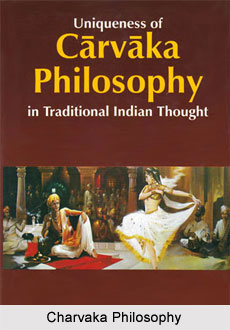 The Charvakas denied the validity of dhartna (self-dharma, righteous duty) in any form. Action when completed, the Charvakas would say, ends there. Apurva or the latent potential form which action takes, or merit and demerit cannot be perceived by anyone at all. They are therefore not real. It is foolish to think that past actions become a kind of unseen force (adrsta) and determines one`s future births. In fact, according to the Charvaka way of life, there is no rebirth. Humans have only one birth and that is the present one. If there is rebirth, one ought to remember it; no one remembers his/her previous births.
The Charvakas denied the validity of dhartna (self-dharma, righteous duty) in any form. Action when completed, the Charvakas would say, ends there. Apurva or the latent potential form which action takes, or merit and demerit cannot be perceived by anyone at all. They are therefore not real. It is foolish to think that past actions become a kind of unseen force (adrsta) and determines one`s future births. In fact, according to the Charvaka way of life, there is no rebirth. Humans have only one birth and that is the present one. If there is rebirth, one ought to remember it; no one remembers his/her previous births.
Accepting only perception as the valid source of knowledge, the Charvakas disapproved the reality of God. No one has ever seen God and no one can see him in future. In fact, in the Charvaka way of life, even the minor gods also do not exist. They and the Vedas belong to the imagination of guileful priests, who invented them to make a living out of them by refereeing at sacrifices, and to awe people into submission by saying that God would punish them if they did not abide by the Vedas. There is no heaven, no hell, no God, and there are no objective ethical laws. The only laws binding men are the laws of the state, obedience to which brings rewards and disobedience of which fetches punishment. And the science (shastra) of the laws of state is the only science worth studying.
What is meant by heaven is the pleasure one has in eating, drinking, making merry and singing. And hell is the pain one experiences in this world itself. There is no point in trying to obtain salvation and a life of eternal quietude; there is an end to life at death and all will be quietened then. The Charvaka way of life speaks that the differences between castes and their distinctive duties are laid down misleadingly by interested people. There are no objective ethical laws, so one can do what one wishes to, provided he is careful that his actions do not bring pain as an outcome.
Charvaka way of life are of the faith that the religion of sacrifices is false and is circularised only by priests concerned in sacrificial offerings. The life of the monk belongs only to impotent persons. Charvakas go on to state that, if the animal offered in sacrifice goes to heaven, why should not man offer his parents in sacrifice instead and send them to heaven? The priests, thus, do not believe in what they preach. They instruct that the offerings made in this world on death anniversaries of ancestors satisfy their hunger and thirst in the other world. If so, an extinguished flame in one lamp should burn, when oil is poured in another. It is useless to make food offerings to people already beyond the realms of this world. Charvaka way of life sates that there is no soul that leaves the body after death and goes to the other world; or else, because of its attachment to its family and friends, it is bound to come back to this very body. Life belongs only to this world and ends in this world. There is no other world. Man should hence try to make the best of this life, without believing in all that the Brahmanic religion preaches. The teachings of the Vedas, viewed by Charvakas, are those appropriate for fools, rogues, or demons. The priests should thus never be trusted and man should do whatever possible to enhance his pleasure and avoid pain. And any action done for the sake of pleasure is justified.
The Charvakas do not seem to have advocated pleasures of the moment, because pleasures of the moment and over-indulgence may result in pain and pain has to be avoided. It is also said that, because pleasure is associated with fine arts like music, they encouraged them and contributed much for their development. And because they were unwilling to kill animals, some of the Charvakas are also believed to be vegetarians.
But the peculiar contribution, which this philosophy seems to have made to the philosophy of life, was the philosophical justification it tried to furnish to any kind of action for the sake of pleasure. Of course, pleasure is not possible in the absence of wealth (artha). By spending money one can obtain pleasure (kama). The value of dhartna (duty) and the value of salvation (moksha) were firmly rejected by the Charvaka School.
Nothing is recognised by this school as a duty. A man can do anything - beg, borrow, steal or murder - in order to accumulate more wealth and more pleasure. But the state laws prevent a man from doing whatever he desires and punishes him when he disobeys them. If he is clever enough to outsmart them, then his action is justified. Otherwise, he should follow them to avert the pain of punishment. Kings, who have the power over the state`s laws, themselves can do whatever they like and do anything for increasing their wealth, power, pleasure and dominion. Thus Charvaka philosophy was later made to support what in Europe was called `Machiavellian policies of princes`.












